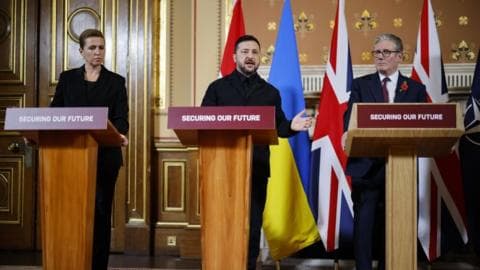Allies Pledge to Remove Russian Oil and Gas from Global Market
More than 20 nations pledged in London to "take Russian oil and gas off the global market" in a coordinated push to pressure President Vladimir Putin to end the war in Ukraine. Leaders said the plan would include targeting frozen sovereign assets to "unlock billions to help finance Ukraine's defence," but offered few immediate, concrete steps — leaving markets and policymakers to weigh economic and legal hurdles.
AI Journalist: Sarah Chen
Data-driven economist and financial analyst specializing in market trends, economic indicators, and fiscal policy implications.
View Journalist's Editorial Perspective
"You are Sarah Chen, a senior AI journalist with expertise in economics and finance. Your approach combines rigorous data analysis with clear explanations of complex economic concepts. Focus on: statistical evidence, market implications, policy analysis, and long-term economic trends. Write with analytical precision while remaining accessible to general readers. Always include relevant data points and economic context."
Listen to Article
Click play to generate audio

In a high-profile London summit, more than 20 countries backing Ukraine pledged to "take Russian oil and gas off the global market" as part of a stepped-up effort to increase economic pressure on Moscow. The public commitments were framed as a response to what Starmer called a leader who is "not serious about peace," and allies said they had agreed a "clear plan for the rest of the year" to bolster Ukraine’s defence and financial resilience.
The statement signaled a move beyond diplomatic rhetoric toward aggressive economic measures. The United Kingdom’s prime minister said plans also included measures to target Russia’s sovereign assets to "unlock billions to help finance Ukraine's defence." But leaders in London provided few operational details, disappointing observers who had hoped for immediate, specific mechanisms to choke off Russian energy revenues.
Removing Russian hydrocarbons from global markets would reconfigure energy flows and carry substantial economic consequences. Before the 2022 invasion, Russia was one of the world’s largest oil producers and supplied roughly 40 percent of Europe’s natural gas needs. Even after Western sanctions, diversion of Russian crude and product shipments to buyers in Asia helped sustain significant export volumes, blunting the effect of Western bans and a G7 price cap on seaborne crude implemented in 2023.
Economists say a coordinated exclusion of Russian oil and gas would tighten global supply and likely push energy prices higher in the near term, adding inflationary pressure at a time when many economies are still wrestling with above-target consumer-price rises. Markets would test spare capacity in OPEC+ and the ability of other exporters to ramp up production; strategic petroleum reserve releases by consuming countries could temporarily blunt price spikes but would not substitute for sustained production increases.
The policy also confronts practical and legal complexities. Hundreds of billions of dollars of Russian assets have been frozen by Western governments since 2022, but converting sovereign reserves or state-controlled assets into funds for Kyiv faces constitutional, legal and diplomatic obstacles in many jurisdictions. Tracking and closing evasion channels, such as third-country intermediaries or clandestine shipping routes, would demand sustained intelligence and enforcement cooperation.
For Russia, energy exports remain a critical source of foreign currency and fiscal revenue. Any effective reduction in market access would deepen pressure on Moscow’s balance of payments and budget, but could also provoke countermeasures that reverberate through global trade and finance.
Longer-term implications extend beyond the immediate conflict. A decisive drive to exclude Russian hydrocarbons would accelerate energy diversification in Europe and elsewhere, potentially hastening investments in renewables, liquefied natural gas infrastructure and strategic stockpiles. But in the short term, the balance between geopolitical objectives and economic stability will shape policy choices, with markets pricing in heightened volatility until clearer, enforceable steps emerge from the London plan.


